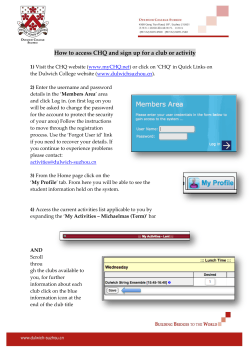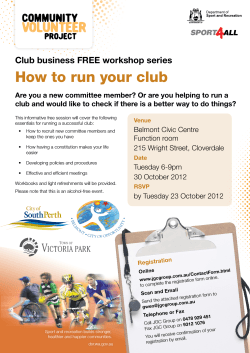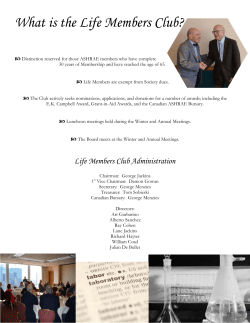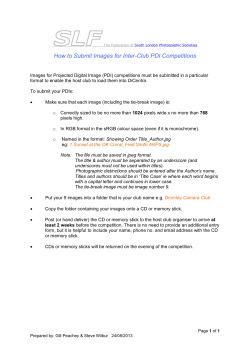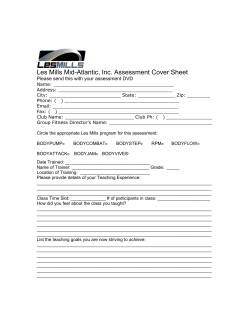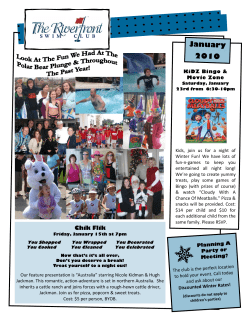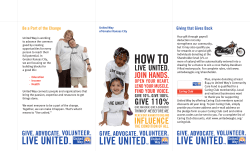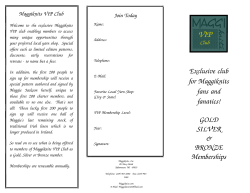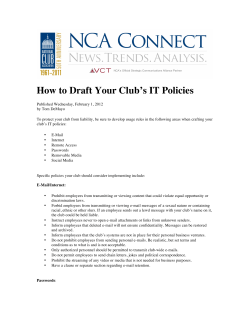
GONZAGA UNIVERSITY OFFICE OF STUDENT ACTIVITIES CLUB SPORTS MANUAL
GONZAGA UNIVERSITY OFFICE OF STUDENT ACTIVITIES CLUB SPORTS MANUAL 2013-2014 As members of the Gonzaga Community: We embrace Jesuit traditions of service, spirituality, social justice, and leadership. We demonstrate honesty and integrity through respect for ourselves, others and our community. We celebrate all people and cultures in pursuit of the greater good. I choose to be a member of the Gonzaga community. I am a ZAG; I am a Bulldog; together, WE ARE GONZAGA PRINCIPLES OF THE ETHOS STATEMENT Respect for Oneself Respect for Others Respect for Property Respect for Authority Honesty and Integrity 1 (Taken from 2012-2013 Gonzaga Student Handbook pg 2) TABLE OF CONTENTS INTRODUCTION………………………………………………………………………………………………………....6 SECTION I: UNIVERSITY POLICIES……………………………………………………………………………7 1.1 University Policies and Expectations…………………………………………………………..7 SECTION II: DUTIES & RESPONSIBILITIES……………………………………………………………….9 2.1 The Office of Student Activities……………………………………………………………….….9 2.2 The GSBA Office of Club Sports…………………………………………………………………..9 2.3 Sports Club Officers…………………………………………………………………………………..9 2.4 Sports Club Coaches, and Advisors………………...…………………………………………12 2.5 Graduate Assistant of Club Sports…………………………………………………………….14 2.6 Game Day Manager………………………………………………………………………………….14 SECTION III: GENERAL PROCESSES…………………………………………………………………………15 3.1 Registering a New Sports Club…………………………………………………………………15 3.2 Annual Sports Club Recognition……………………………………………………………….16 3.3 Facility Scheduling…………………………………………………………………………………..16 3.4 Holding an Event on Campus……………………………………………………………………16 SECTION IV: TRAVEL POLICIES & PROCEDURES…………………………………………………….18 4.1 General Travel.………………………………………………………………………………………..18 4.2 Pre-Trip Meeting….…………………………………………………………….……………………18 4.3 Long Distance Driving……………………………………………………………………………...19 4.4 Driving at Night……………………………………………………………………………………….19 4.5 Travel Kit………………………………………………………………………………………………..19 SECTION V: INJURY & EMERGENCIES……………………………………………………………………..21 5.1 General Risk Management………………………………………………………………………..21 5.2 On-Campus Injuries and Emergencies………………………………………………………21 5.3 Off-Campus Injuries and Emergencies………………………………………………………22 5.4 Concussion Procedures……………………………………………………………………………23 SECTION VI: CLUB CONDUCT……………………………………………………………………………………25 6.1 Alcohol Policy………………………………………………………………………………………….25 6.2 Drug Policy……………………………………………………………………………………………...25 6.3 Hazing…………………………………………………………………………………………………….25 6.4 Sexual Harassment and Title IX………………………………………………………………..26 2 SECTION VII: Eligibility and Membership……………………………………………………………......27 7.1 Basic Eligibility Requirements………………………………………………………………….27 7.2 Club Membership…………………………………………………………………………………….27 7.3 Club Roster……………………………………………………………………………………………..27 APPENDIX………………………………………………………………………………………………………………..28 A On-Campus Incident Report………………………………………...………………………………………...28 B Visiting Team Waiver………………………………………………...………….……………………..………..29 C Field Condition Report…………………………...……………………………………………………………...30 D Gonzaga University Student Participant Agreement, Liability Release, and Risk Assumption Agreement……..............................................………………………………………………31 E Driver Agreement Addendum…………………………………………………………...……………………33 F Car Owner Approval Addendum………………………………………………………...…………………..34 G Student Travel Booking Checklist.........................................................................................................35 H Travel Flowchart…………………………………………………………………………………………………...36 3 CONTACT INFORMATION For questions or comments regarding this manual or the procedures herein, contact the following: OFFICE OF STUDENT ACTIVITIES David Rovick Assistant Director of Student Activities Work Phone: (509) 313-4069 Email: rovick@gonzaga.edu Whitney Brooks Programming Specialist Work Phone: Email: brooksw@gonzaga.edu Kerrie Childs Program Coordinator Work Phone: (509) 313-6123 Email: childs@gonzaga.edu Br. Steve Souza Business Manager Work Phone: (509) 313-5484 Email: souza@gonzaga.edu Mike Ostman Graduate Assistant for Club Sports Cell Phone: (612) 306-5484 Email: mostman@zagmail.gonzaga.edu 4 GONZAGA STUDENT BODY ASSOCIATION Kyle Swartz Director of Clubs and Organization Work Phone: 509-313-4087 Email: gsba-clubs@zagmail.gonzaga.edu Alexis Hartmann Club Sports Chair Work Phone: 509-313-4087 Email: gsba-clubsports@zagmail.gonzaga.edu RUDOLF FITNESS CENTER Shelly Radtke Associate Director for the Rudolf Fitness Center Work Phone: (509) 313-3977 Email: radtke@athletics.gonzaga.edu 5 INTRODUCTION The Office of Student Activities welcomes every Gonzaga University student interested in club sports. We hope this manual will offer the Gonzaga University community a better understanding of the Club Sports Program by supporting students to become involved and enjoy their student life experience within the Gonzaga Student Body Association. The Office of Student Activities strongly recommends that every sports team officer becomes familiar with the information and other documents provided in this manual. Information in this manual is subject to change and may be updated and provided accordingly. Gonzaga University recognizes club sports are competitive by nature and students may be at risk. To ensure institutional compliance and student safety the Office of Student Activities requires sports clubs and their student members to complete various forms and institutional documents throughout the academic year. Please note that any policy or procedure concerning club sports that is not covered in this manual should be referred to the most recent Gonzaga University Handbook, the general Club Manual, and directly to the Office of Student Activities Staff. 6 SECTION I: UNIVERSITY POLICIES 1.1 University Policies and Expectations The student conduct expectations and standards apply to behavior on University property, at all university sponsored activities held on or off-campus, and to students’ off campus behavior which may negatively impact the institution and/or the institutions reputation. Expectations and standards apply to both the individual student and any student organization. In addition to the student conduct expectations and standards, student organizations must adhere to the following student organization expectations. All clubs and organizations will: Be consistent with the University’s Mission and Ethos statement and abide by any and all University policies and procedures. Ensure that club involvement and activities do not adversely effect the academic success of their members or other Gonzaga community members. Follow all state, local, and federal laws. Follow the policies and procedures of their sponsoring organization. Have an advisor who is a professional faculty or staff employee of Gonzaga University or an affiliate of Gonzaga University, i.e. Sodexo. Abide by Gonzaga’s policies and procedures in both on- and off-campus activities. Follow the club or organization's own constitution and by-laws. Be responsible for all financial transactions done by and/or in the name of the club. All financial transactions will proceed through the club's controller account or GSBA. No offcampus bank accounts are allowed. Have at least ten student members. Register their club annually with the Clubs & Organizations Office. Any club that is inactive for over four years will be expected to repeat the club recognition process. Follow the University “Events Policy” for all events and programs. Understand and abide by the University Hazing Policy and Alcohol Policies. Maintain good communication with the Office of Clubs and Organizations by checking, updating and maintaining their Zagtivities website and checking their club mailbox at least once a week. Follow all policies and procedures of the various departments and/or organizations with which they may interact. These may include, but are not limited to, the Controller’s Office, University Relations, Campus Services, GSBA, Student Activities, Sodexo, Athletics, Security, etc. Accept responsibility for members' behavior. This includes behavior during official or unofficial events, when actions are performed in the name of the organization, or whenever the action of a member draws attention to the organization rather than to the member as an individual. 7 All philosophical or general changes in the clubs original recognition paperwork must be submitted to the Clubs & Organizations Office immediately so as to not affect the clubs standing with the University. Registration and/or recognition does not commit the University to the proposed programs of any organization. Student organizations that fail to meet the expectations or violate the conduct standards may be subject to a judicial hearing and organizational sanctions. 8 SECTION II: DUTIES & RESPONSIBILITIES 2.1 The Office of Student Activities The Office of Student Activities Staff serves as the primary administrators of the Club Sports Program, as the Club Sports Program is student based. 2.2 The GSBA Office of Club Sports The GSBA Office of Club Sports serves as a liaison between the administrators and the general student body for all topics pertaining to club sports. 2.3 Sports Club Officers 2.3.1 President: The club President will be responsible for completing the most important elements of running a successful organization. The President is ultimately responsible for making sure the club, its officers, and its members are fully compliant with all policies and procedures, but can delegate tasks as he/she sees fit. These duties will include, but are not limited to the following: Provide the overall vision and direction for the club. Serve as the liaison between the club members and the Office of Student Activities. Attend all club meetings. Schedule and lead club meetings. Monitor the activities of the club to ensure compliance to the policies and procedures of Gonzaga University, the Office of Student Activities, the Student Code of Conduct, and the club's national governing body. Work with other club members to promote the club. Notify the GSBA Office of Club Sports and Shelly Radtke immediately of any schedule changes. Ensure that members are up-to-date on policies and procedures from the Club Sports Manual and the general Clubs Manual. 9 Train the future president on duties and procedures. Maintain inventory of club equipment and supplies. Submit necessary paperwork (ensure all members complete all required paperwork), forms, and reports by the indicated deadlines (all paper, forms, and reports will be detailed in the Appendix) Adjudication of Disciplinary Problems: The Club President will work with the GSBA Office of Club Sports and the Club Sports Council to resolve any conflicts, disciplinary matters or complaints regarding the club’s behavior or report any violation(s) in policies. Mailbox: The club President will be responsible for checking the club mailbox regularly. Email: The President is responsible for checking any club email address regularly and providing prompt replies to requested information. Sport Club Meetings: The President is responsible for attending all meetings scheduled with University Recreation and ensuring the presence of other required members. If the President cannot make a scheduled meeting, the Vice President or Treasurer should be in attendance. Attend mandatory First Aid/ CPR Certification training 2.3.2 Vice President/Risk Manager: The Vice President's main responsibility will be to assist the President by ensuring all club requirements are met. Duties will include, but are not limited to the following: • Preside over club meetings and business during the President’s absence. • Attend mandatory meetings with or in the absence of the President. • Attend mandatory First Aid/CPR Certification. • Assist the President as needed. • Learn the role of the President (typically, this position will later become the club President). 10 • Inspect the area of play before any practice or competition to ensure that the playing area is free of foreign objects and other conditions that would make the area unsafe for play. • Report any dangerous playing areas to the Grad Assistant of Club Sports/Game Day Managers so the problem can be addressed. • Act as CPR/First Aid/AED first responder during all club sports competitions, practices, etc. in all situations where a Game Day Manager or trained professional is not present. • File injury accident reports with the GSBA office of Club Sports. • Ensure that all club participants act in accordance with the safety policies and procedures of the facility being used and those within this manual. 2.3.3 Treasurer: This position must remain separate from all other offices of the club in order to ensure checks and balances within each club and to ensure all funds are handled properly. The duties include, but are not limited to the following: • Collect dues (if applicable). • Make deposits. • Submit proper paperwork for reimbursements, PO’s, advances, invoices, etc... • Keep an accurate financial record including all receipts to document expenditures. • Submit a Treasurer’s Report to the GSBA Director of Finance for the Fall and Spring semesters. • Work with the President to create a club budget. • Work with the GSBA office of Club Sports and the Office of Student Activities to develop budgets and budget requests and to ensure efficient use of funds. • At no time may a club run a financial deficit. If this occurs and club cannot meet financial obligations, the Treasurer is to notify the GSBA office of Club Sports and club members within five (5) business days. The President and Treasurer will be required to schedule a meeting with the Graduate Assistant of Club Sports and discuss potential solutions and ways to avoid this situation in the future. 11 If financial obligations cannot be met and a solution cannot be reached, the club will be immediately placed on probation. 2.3.4 Secretary: Clubs are strongly encouraged to elect a Secretary for purposes of record keeping (meeting minutes, log of club events, attendance, etc...). If a club chooses not to elect a Secretary, then record keeping duties should be assigned to another club member. The Secretary's duties include but are not limited to the following: • Attend all club meetings and record minutes and submit meeting minutes to the GSBA Club Sports Chair via email no later than five (5) business days after the meeting. If meeting minutes are not submitted, then no meeting will be considered to have occured should an internal dispute arise, and the club will be required to have another meeting to hold a vote and/or make decisions regarding club business. • Conduct correspondence for the club and update the club roster and submit any changes to the GSBA Office of Club Sports. • The President may assign additional duties to aide in collecting paper work, forms, and reports. 2.4 Club Sports Coaches and Advisors 2.4.1 Club Coaches It is the responsibility of each club to secure the services of a coach/instructor if they so choose to have a coach. The coach/instructor should limit their contributions to those involving their coaching skills and knowledge. Club Sports coaches and instructors must be advised that any contract for their services is between the coach/instructor and the club. Coaches and instructors are not employees of Gonzaga University. Club Sports business matters (hosting tournaments, submitting forms, equipment requests, etc.) must be handled by the student member with the coach/instructor serving in an advisory capacity. 12 2.6.2 Club Advisors All clubs are required to identify a member of the GU Faculty or Staff (must be benefits eligible) to act as the clubs on-campus advisor. The club advisor serves as a valuable resource to academic success as well as a resource to navigate the university system. Responsibilities of the club advisor include, but are not limited to the following: o Attend important club meetings. o Attend competitions on a periodic basis. o Provide club continuity from year to year by assisting with officer transitions. o Provide valuable feedback for decision-making. o Oversee, but DO NOT assist with scheduling, budgeting, and financial transactions. o Relay policies and expectations to the club, as coordinated with the Graduate Assistant for Club Sports. o Act as a mediator if conflicts should arise internally with the club. o Advocate for the club and be in attendance for any club conduct review meetings. o Under no circumstances is the club advisor allowed to enter into agreements/contracts, and/or force their views and opinions upon club members. 13 2.5 Graduate Assistant of Club Sports The Graduate Assistant of Club Sports is available to act as an advisor to the GSBA Club Sports Chair and to assist in the development and functioning of the Club Sports program. He/she will act as a moderator at each Club Sports Council meeting and be available to answer any and all questions that may arise throughout the calendar year. 2.6 Game Day Managers Game Day Managers must be present at each on-campus club sports event. Their duties will be to supply the sports club with all requested equipment, handle emergency situations that may arise, and ensure the quality of Gonzaga University facilities prior to, and immediately following an event. The Game Day Manager’s duties and responsibilities include and are not limited to: · Assist the Graduate Assistant of Club Sports to: · Supervise all on-campus Club Sports events. · Enforce risk management policies to ensure proper procedures are followed to ensure safety and compliance. · Help maintain the quality of facilities through the tracking of field conditions. · Provide all requested equipment to club officers upon request in a timely fashion. · Assist the GSBA Office of Clubs and Organizations with equipment inventory. 14 SECTION III: GENERAL PROCESSES 3.1 Registering a New Sports Club Students who are interested in registering a competitive sports club are required to complete the following: 3.1.1: Attend the New Student Group Recognition Cycle Info Session (2 offered per semester) with the Gonzaga Student Body Association Director of Clubs and Organizations. During the meeting, the Director of Clubs will provide a list of current clubs. If the proposed sports club is not recognized, the Director of Clubs shall assist the interested students in completing all required registration documents. 3.1.2: Applications will become live on Zagtivities after the info session and all attendees will be invited to complete an application on the Zagtivities website. Prospective student groups need to submit their application to Zagtivities within five business days from the informational meeting. Director of Clubs shall review all applications, and may request changes or adjustments to the current application. 3.1.3: Director of Clubs and Organizations will send all applications to the New Student Group Recognition Committee for one week of review. 3.1.4: The Student Group Recognition Committee will hold a meeting for the prospective student groups to come and advocate for their student group. In order to progress in the application process, a representative from the prospective student group needs to be in attendance. 3.1.5: After meeting with the Student Group Recognition Committee the committee shall deliberate and provide a recommendation to the Director of Student Activities. The Director of Student Activities shall either approve or deny the registration of the proposed student group. 3.1.6: If the student group is approved as a new sports club, the new sports club officially becomes a recognized Gonzaga University Sports Club, and is required to fulfill its roles and responsibilities as outline in the updated Student Group Manual 2013-2014 . Upon approval, the sports club’s primary contact becomes the GSBA Club Sports Chair. * If request to become a new student group is denied, the prospected student group may work with the GSBA Club Sports Chair to appeal the decision * 15 3.2 Annual Sports Club Recognition The Office of Student Activities requires every continuing student group from the prior academic year to seek annual recognition. Annual recognition shall be conducted during the beginning of the academic year. The Office of Student Activities with the Gonzaga Student Body Association shall notify every sports club at minimum one-month prior to the deadline. Every club sport shall be required to complete the student group recognition form. 3.3 Facility Scheduling 3.3.1: Facilities ◦ Request and Reservation Requests can ONLY be made by President/Vice President for to Shelly Radtke for: Practices Competitions Additional Reservations Cancellations Field Use ◦ Athletics reserves the right to utilize facilities over students 3.4 Holding an Event On-Campus 3.4.1 Event Registration: Follow the Event Registration Process outlined in the general Club Manual 3.4.2 Game Day Managers: A Game Day Manager MUST be present at each club sports competitive event that occurs on-campus. 3.4.3 Use of Institutional Equipment: 2 weeks prior to the event, the President of the club sport must communicate with the Student Activities Office as to what equipment is needed. The Game Day Manager will bring all the necessary equipment to the site of the event no later than 2 hours before its designated start time. 3.4.4 Field Condition Report: Prior to the start, and immediately following the completion of said event, the Game Day Manager will fill out a “Field Condition Report” and require the signature of the respective Sports Club’s President. This is to ensure that the condition of the facility is on record and eliminate the risk of disciplinary actions against the club for damage they did not commit. 16 3.4.5 Referees: If referees are required, it is the responsibility of the club to ensure that they are qualified and have received the minimum amount of training required by the club's respective governing body. 3.4.6 Visiting Players: All visiting teams must have each competing player fill out the Visiting Team Liability Waiver prior to the start of competition. 17 SECTION IV: TRAVEL POLICIES for CLUB SPORTS 4.1 General Travel For anything not covered here, please refer to the general Club Manual 4.1.1 International Travel not possible: At this time clubs are not allowed to travel internationally as a club (with the exception of Canada). If a club has interests or pursuits abroad, members cannot travel to said locations as a club. For questions or concerns about international travel, please speak with the Office of Student Activities. 4.1.2: University Required Booking Agency: Upon submitting an event to Zagtivities, if the user has indicated that they will need to book flightsetche user will be directed to fill out the Student Travel Booking Checklist (Appendix G) and meet with the Business Manager to establish that the club has enough funds in its account to accommodate the travel. Upon receiving approval from Business Manager the user will meet with the Program Coordinator to book their flights using the university contracted travel provider. For hotels, rental cars, busses etc., students should research what they would like to book and fill out a purchase request on Zagtivities for each item. Upon approval from the business manager the Purchasing Office will book the clubs accommodations using the booking agency. A Flowchart of this process can be found in Appendix H. 4.1.3 Driver Agreement and Owner Forms: When using personal vehicles it is the responsibility of the club to ensure that all drivers have submitted at sign Driver Agreement (Appendix E), and that a Owner Approval Addendum (Appendix F) has been filled out for each vehicle being used. These forms only need to be filled out once per academic year. 4.1.4 Travel Form: Upon receiving conditional approval for an event and booking travel through the university required booking agency, the user will be redirected to the Student Activities group on Zagtivities to fill out the trip/travel form. This form must be submitted 5 days prior to departure. The form will include the following: Travel/Trip Form Participant list Trip itinerary Weather forecast for destination and any mountain passes Driving directions with map Driving directions to nearest medical emergency facility If applicable include the following: Trail maps 18 Vendor information Permits of passes needed Failure to follow the travel and/or driver policies presents a great risk to you, your club and the university. Violations or non-compliance will be treated seriously and could result in disciplinary action against the club. 4.2 Pre-Trip Meeting 4.2.1 Prior to departure, one representative from the traveling team must attend a predeparture meeting with the Graduate Assistant of Club Sports. Upon submitting travel forms, officers will be asked to sign up for a 15 minute time slot for this meeting the WEDNESDAY prior to departure. Failure to attend this meeting will result in travel being denied. The meeting will include the following: a. Review of travel and game emergency action plans b. Review of behavior guidelines for the trip c. Finalize itinerary d. Finalize participant list 4.3 Long Distance Driving The following guidelines must be followed when traveling long distances: Maximum driving distance of 500 miles one way o Anything over 500 miles must involved a discussion with the Office of Student activities to arrange an alternative mode of transportation To avoid fatigue, two or more drivers must be available for all trips exceeding four hours or 200 miles; drivers must switch every four hours or 200 miles MINIMUM. Drivers should take a 15 minute break every 2 hours of driving. The “shotgun” passenger is obligated to assist the driver with navigation, watch the road, and keep the driver attentive 4.4 Driving at Night The following guidelines should be followed for traveling at night: Clean all exterior lights prior to leaving. 19 Reduce speed and increase following distances. Do not overdrive car's headlights. Car should be able to stop inside the illuminated area. If an oncoming vehicle does not lower their high beams, avoid glare by watching the right edge of the road, using it as a steering guide. Make frequent stops. If too tired to drive, the driver is obligated to stop and rest. Take into account that twilight is one of the most difficult times to drive. The driver's eyes are constantly change to adapt to the increasing darkness. 4.5 Travel Kit 4.5.1 When traveling for a sporting event, every club must be equipped with a Travel Kit. This bag must be checked out when travel forms are submitted, and an inventory must be kept so that supplies can be replenished after each use. Travel Bags must be returned to Student Activities within 48 hours of returning to campus. The following items are included: First Aid Kit Incident Reports Laminated copies of emergency procedures Copy of the travel for m with up-to-date information 20 SECTION V: INJURY & EMERGENCIES 5.1 General Risk Management Safety of participants is of the utmost importance. There are inherent risks involved in all recreational/competitive sport programs. Participants in the Sport Club Program should be aware that involvement is totally voluntary and that Gonzaga University is not liable for any injuries resulting from participation. It is the responsibility of each club to minimize risk of injury in all club activities. EACH CLUB WILL HAVE EVERY MEMBER FILL OUT THE CLUB SPORTS WAIVER AND RELEASE OF LIABILITY FORM. Each club shall develop, implement, and practice the following safety policies: Club Sports Officers, club members, and coaches/instructors should always emphasize safety during all club activities. Develop and practice safety guidelines relevant to said sport. Ensure that all team members have health insurance prior to participation. Inspect fields, facilities, and equipment prior to every practice session, game, or special event. Report unsafe conditions to the Graduate Assistant of Club Sports and/or Game Day Manager immediately. If at an off-campus site, report the condition to the proper managing authority. Do not use or try to improve fields, facilities, or equipment if deemed unsafe. 5.2 On-Campus Injuries and Emergencies 5.2.1 General Injury and Emergency Procedure: Each Club must file an Accident Report Form, for each accident that may occur during practice or competition. These forms must be turned in to the G SBA Office of Clubs no later than 48 hours after the accident/injury. If an accident or emergency situation should occur, please remember to adhere to the following steps: 1. First, seek medical attention that is necessary. 21 2. Second, make notification of the incident to the Sport Club Coordinator. If the Sport Club Coordinator cannot be obtained, contact with the University should be made according to the GU Recreation Services Emergency Procedures and Notification List for Registered Organizations listed. 3. Third, follow up with an “Accident Report Form”. o Remember, the first step in any emergency is to ensure that all persons are safe, and to call for assistance, as needed. • When hosting a competition, practice, or special event on University property, clubs must have visiting team members or individual participants sign and complete a “Visitor Waiver & Release of Liability Form” before they participate. These forms must be filed with the Club Sports Staff no later than 48 hours after an event. Failure to comply with • this policy will result in the loss of facility privileges for Special Events and/or competitions using University facilities. If a serious accident, death, or assault were to occur during a Club Sports activity oncampus, the first step would be to ensure that all persons are safe. If necessary, call or send for assistance. Dial 911 for Emergency Assistance. In the event of an emergency, notify the appropriate University Office of the situation. 5.2.2 Emergency Procedures for Special Situations In the event that one of the following emergencies occurs during a club sports practice or contest, please follow directions listed below. Blood/Chemical Spill- Cease activity and contact GU staff member on duty for clean-up. Do not clean up the spill on your own . • Fire Alarm- Cease activity and use nearest exit to leave building. • • Water Leak- Cease activity and report leak to GU staff member on duty who will then determine cleanup procedures and whether or not activity can continue. Power Outage- Cease activity and follow direction of GU Game Day Manager on duty. 5.3 Off-Campus Injuries and Emergencies 1. If a trainer is available, let the trainer or EMT handle the injury 1A. If there is no trainer, medical emergency personnel, or campus security 911 call 22 2. If the injured player is taken by ambulance/teammate/family member to a medical facility obtain the following information prior to their departure: a. Name of the injured player b. Nature of the injury c. Location being taken (campus health center, hospital etc) Street address, city, and phone number 3. DO NOT leave the injured player alone at any time. 4. Immediately after calling for medical assistance, call the following individuals until someone can be reached (not just a voicemail). Make sure to have these phone numbers available at all times. Dave Rovick Mike Ostman Respective Club Advisor 5. Fill out an accident/injury report immediately and submit it to the Office of Student Activities within 48 hours returning to campus. 5.4 Concussion Procedures University Recreation takes head injuries and concussions very seriously. The risk of catastrophic injuries or death is significant when a head injury or concussion is not properly evaluated and managed. Concussions are a type of brain injury that can range from mild to severe and can disrupt the way the brain normally works. Concussions can occur in any organized or unorganized sport or recreational activity and can result from a fall or from players colliding with each other, the ground, or with obstacles. Concussions occur with or without loss of consciousness, but the vast majority occurs without loss of consciousness. Continuing to play with a concussion or symptoms of head injury leaves the individual vulnerable to greater injury and even death. 5.4.1 When the concussion occurs: If a club member is suspected to have sustained a head injury or concussion during competition, play, practice or conditioning, the member must immediately be removed from all activity. Do not try to judge the severity of the injury yourself. Immediately refer the club member to the appropriate athletics medical staff, such as a 23 certified athletic trainer or health care professional experienced in concussion evaluation and management. Emergency procedures should be followed and an incident report must be completed and submitted to the Office of Student Activities 5.4.2 Returning to play: If a club member is suspected to have a head injury or concussion, the member is not allowed to return to competition, play, practice or conditioning until he or she is evaluated by a doctor, receives written medical clearance to return, and submits a copy of the written medical clearance to the Office of Student Activities A return-to-play progression should occur in an individualized, step-wise fashion with gradual increments in physical exertion and risk of contact. There is zero-tolerance for clubs not following this process. 5.4.3 Common symptoms the athlete will experience after a concussions include the following: confusion or feeling dazed, clumsiness, slurred speech, nausea or vomiting, headache or “pressure” in head, balance problems or dizziness, blurred vision, sensitivity to light, sensitivity to noise, sluggishness, ringing in ears, behavior or personality changes, concentration difficulties, and memory loss. 5.4.4 Common symptoms that teammates may observe after a teammate has suffered a concussion: Appearing dazed or stunned, forgetting plays, unsure of the game/score/opponent, moves clumsily, slow reaction time, any loss of consciousness, behavior or personality changes, can’t recall events before or after the injury. 24 SECTION VI: CLUB CONDUCT 6.1 Alcohol Policy Please refer to the 2012-2013 Club Manual for further details about on-campus alcohol policies. No alcoholic beverage may be purchased through a sport club’s funds, nor may the purchase of alcohol for members or guests be undertaken or coordinated by any member in the name of, or on the behalf of, the sport club. All membership recruitment activities with any sport club shall be alcohol free. No event shall include any form of “drinking contest” or encourage the rapid consumption of alcohol in the activity or its promotion. When traveling, you are considered to be representing Gonzaga University from the time you leave campus until the time you return. Club members and participants MAY NOT consume any alcohol during a club sports travel event at any time. Club members are prohibited from the consumption of alcohol 6 hours prior to participating in any club activity, and shall not participate under the influence. If the game is an away event, members are prohibited from the consumption of alcohol 24 hours prior to their departure. If operating a university vehicle, club members are prohibited from consumption of alcohol at least 48 hours prior to departure. 6.2 Drug Policy There will be a zero tolerance policy for the use of any illegal drugs. Members found to have used illegal drugs at any time will forfeit their eligibility. 6.3 Hazing As outlined in the University’s Ethos Statement, Respect for Oneself and Respect for Others are cornerstones on which Gonzaga’s students base their individual growth and development. Traditions are important at Gonzaga and some of these traditions include rituals and rites of passage which link us to the University’s past and help us prepare for the future. These actions can build important bonds between individuals and groups. It is imperative to remember that the relationships and bonds that are created in our community are to always be deeply rooted in mutual respect, and not through senseless activities or humiliation. Any hazing actions, including, but not limited to, those which produce mental discomfort, physical discomfort, or ridicule are expressly prohibited. Willing participation by persons being suspected of being hazed does not override this policy. Hazing is a form of victimization. It is pre-meditated and not accidental. Hazing consists of a broad range of behaviors that may place 25 another person in danger of physical or psychological discomfort or harm or of activities that demonstrate disregard for another person’s dignity or well-being. A level of coercion is often involved, i.e. those being hazed either couldn’t or didn’t feel they could opt out because of the peer pressure involved and the desire to belong to the group. Hazing incidents typically involve perpetrators (the planners and organizers), bystanders (those who participate but were not hazed or involved in the planning or organizing), and victims, (those who were hazed). All involved are responsible for their behavior, but consequences will generally differ based on the seriousness of the incident and one’s level of responsibility, planning or participation. Hazing is a form of harassment. Hazing is not limited to group activity alone, but includes individual behavior, which subjects another to abusive conduct, or ridiculous or annoying tricks or pranks. Because hazing and some initiation-related practices threaten the self-esteem and safety of students, and subsequently the University as a whole, Gonzaga adopts the following policy statement: Hazing is defined as any act which endangers the mental or physical health or safety of a student, or which destroys or removes public or private property for the purposes of initiation, admission into, affiliation with, or as a condition for continued membership in a group or organization. Hazing related conduct includes, but is not limited to, embarrassment; ridicule; sleep deprivation; verbal or physical abuse; personal humiliation; excessive fatigue; physical and/or psychological shock; humiliation; encouraging or requiring a person to consume alcohol, drugs or foreign or unusual substances; requiring the wearing of conspicuous apparel in public; requiring the carrying of “burdens” in public; and moral degradation or substantial interference with the person’s educational pursuits. Student organizations, as well as students, are expected to design their programs and policies in accordance with the principles of Gonzaga University as described in the University Mission Statement and the University Student Handbook. Individual members, organizational activities, and developed policies should promote the ideals of the University and its Jesuit foundations which emphasize individual well-being, a strong academic commitment and a sense of, and a respect for, self and for others. Student organizations and individuals which fail to adhere to this policy statement or expectations will be subject to disciplinary actions and sanctions as outlined in the University Student Handbook. 6.4 Sexual Harassment and Title IX In accordance with Gonzaga University, the Office of Student Activities will not tolerate any sexual, racial or gender harassment or any other form of harassment. Harassment is discussed in the Code of Student Conduct. Understand that students will be held to the highest standards of compliance in this area. This policy extends to the competition arena and any negative verbal or nonverbal action or word will not be tolerated. 26 SECTION VII: Eligibility and Membership 7.1 Basic Eligibility Requirements Participants must be an matriculated undergraduate and graduate student. Participants must have a liability waiver on file. Participants must adhere to the specific requirements to the respective sport’s governing body/league. Gonzaga University reserves the right to inspect a student’s eligibility at any time. 7.2 Club Membership All clubs will provide their membership selection process to the GSBA Club Sports Chair in writing at the beginning of the school year. All club members must meet all requirements set by federal, state, local, and institutional laws. Sports clubs are generally gender based unless the said sport or league states otherwise. Membership is determined by each individual sports club and must abide by the club constitution. All sports clubs must ensure an equal process where perspective students who are interested in the club sport are eligible to seek membership. No perspective members shall be discriminated against. If it is found that discrimination of any kind has occurred, severe penalties will ensue with at MINIMUM, the club being placed on probation. Harsher penalties may be levied based on the severity and extent of the issue at the administrations discretion. 7.3 Club Roster All clubs must keep an up-to-date roster on file in the Office of Student Activities. Changes may be submitted in e-mail form to the GSBA Club Sports Chair. These changes should also be reflected on the club's Zagtivities profile. Failure to keep an up-to-date roster will result in disciplinary actions. 27 APPENDIX A. On-Campus Incident Report 28 B. Visiting Team Waiver 29 C. Field Condition Report 30 D. Gonzaga University Student Participant Agreement, Liability Release, and Risk Assumption Agreement for Club Sports 31 32 E. Driver Agreement Addendum 33 F. Car Owner Approval Addendum 34 G. Student Travel Booking Checklist 35 H. Travel Flowchart 36
© Copyright 2025
